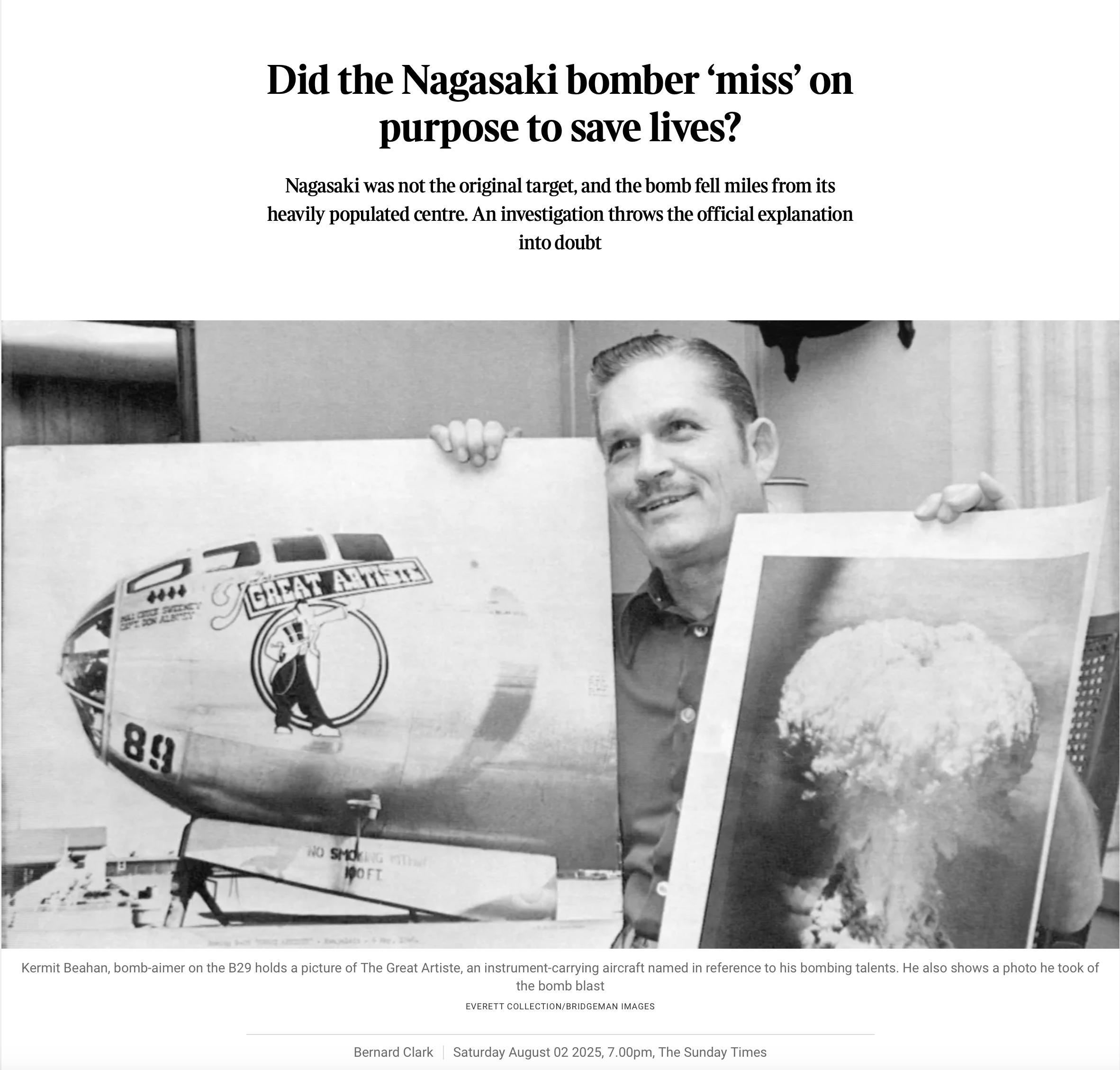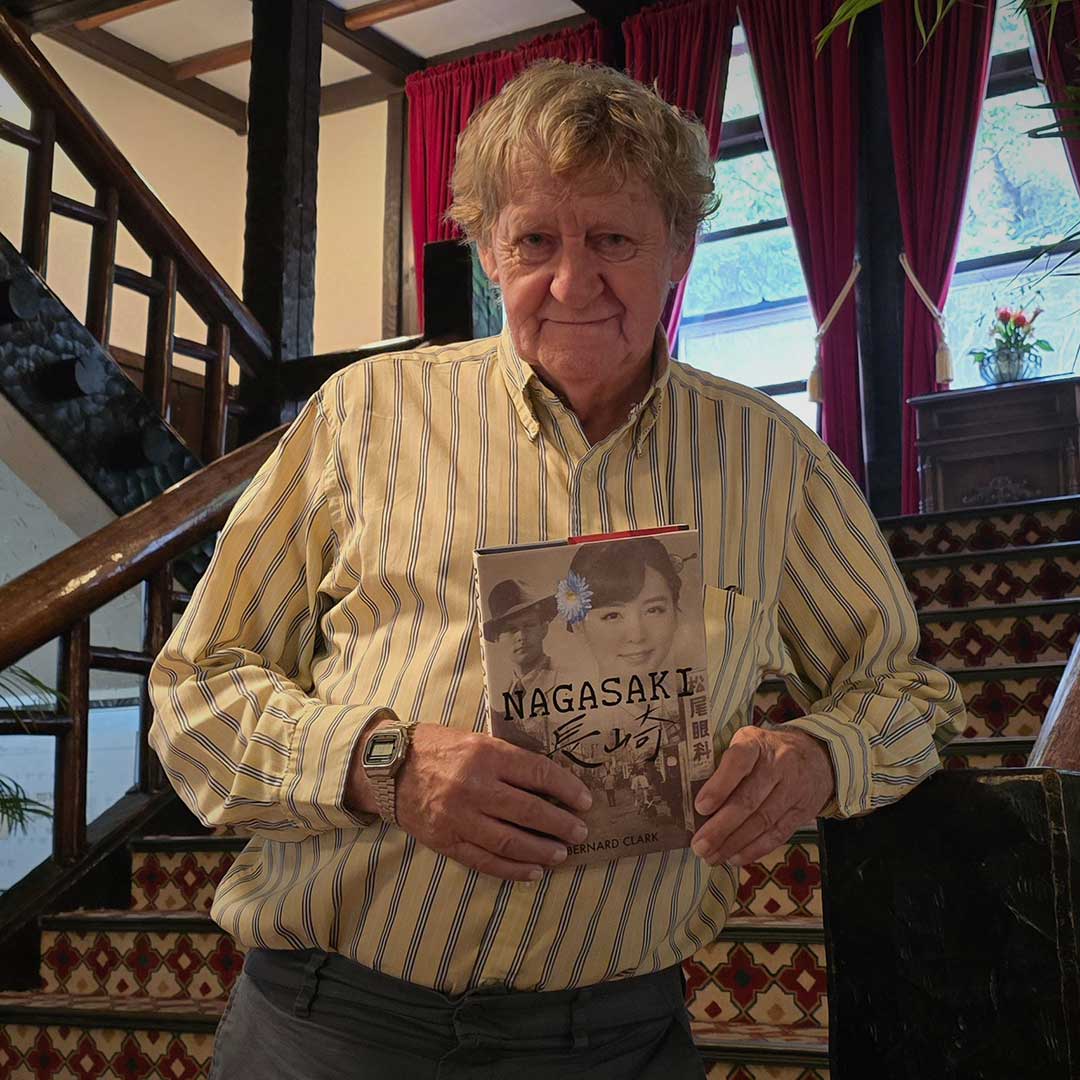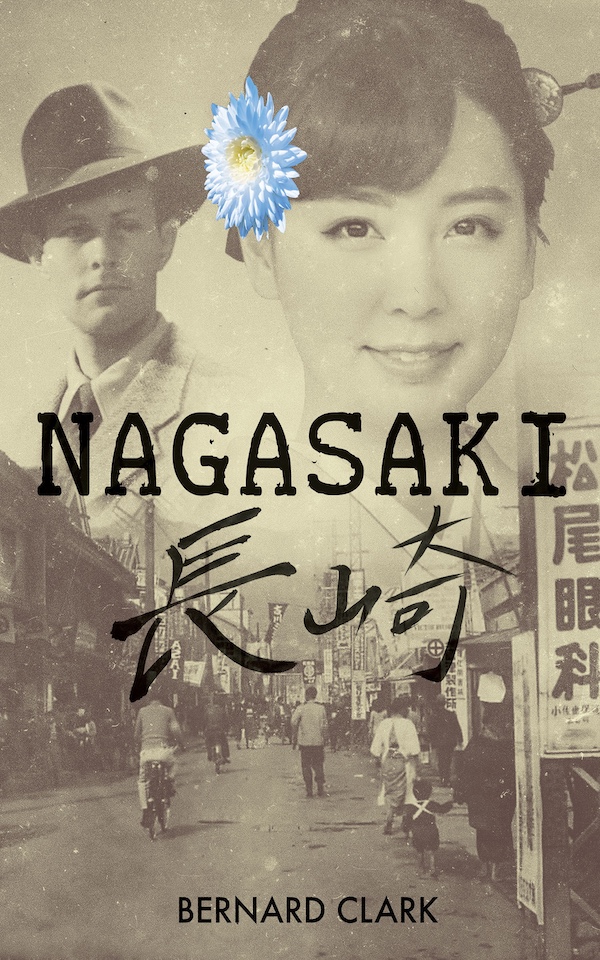best selling author Bernard Clark
Nagasaki
‘In love and war, nobody wins…’
This is the story of Daniel Lawrence, a rootless Englishman sent to Japan to spy for the Americans during the height of World War II. But as he delves deeper into his mission, he finds himself caught in a different kind of conflict – one of the heart. His lovely interpreter, Ayako, draws him in with her beauty and grace, but their love is threatened by the impending war. And when Pearl Harbor is attacked, everything changes.
As featured on Radio 4’s The Today Programme – 09/08/2025
Interview - Today Programme - Radio 4
Contact The Author
As featured in The Sunday Times 3rd August 2025.


Bernard Clark
Author
My Story
Bernard Clark was born into a British military family, spending his formative years in a dozen different countries, before joining the BBC.
After spells as a reporter, presenter and foreign correspondent, he began making documentaries and factual series in the UK and the US, then launched a London-based independent production company in the mid-1980s, which is still thriving forty years later.
Bernard began his relationship with Japan in 1988, with the award-winning ‘Japan Season’ for Britain’s Channel 4 – 53 hours of programming across five weeks. Since then he has worked for every Japanese TV network, and won the coveted Japan Prize. His company TVT KK has translated and transmitted BBC World News in Japan for over thirty years.
Bernard has written several books, including A Mother Like Alex, the story of a woman who adopted nine special-needs children, primarily with Down’s Syndrome, which was a best seller.
He lives with his family on a farm near Newbury, England.
AFTERWORD
Historical Note from the Author
What is truth and what is fiction? The eternal conundrum for a novel based on history, which – like truth – is subject to judgement and interpretation. Even official documents lie, often deliberately, to justify the unforgivable, or sometimes, in modern parlance, to protect an institution’s ass. For instance, the invention of clouds, or smoke across the target by the US Army Air Force, because they didn’t kill enough people.
Further, the dropping of the world’s biggest-ever bomb created generations of prejudice, based on morality or points of view – it was very different for those on the ground, for those in the aircraft, very different for the Japanese, and the Americans who sent the bomb. Tricky terrain to navigate.
And, as always, special personalities play a great part – in this story, US Army Air Force Bombardier, Captain Kermit Beahan.
The key facts are incontrovertible. After three runs across the primary target through a clear sky over Kokura, Beahan did not drop the bomb. Had he done so, at least three hundred thousand people would have been killed. When they reached the secondary target, Nagasaki, in spite of now being authorised to drop using radar, making a bullseye simple, he chose to drop Fat Man on a hill two miles short, so the massive blast largely flew over the city. Instead of an estimated one-hundred-thousand-plus being killed, six months later the toll was only thirty-eight thousand.
I say ‘only’ because that’s what modern warfare is about – relativity, numbers, cold statistics. Which wasn’t the book I wanted to write.
While Beahan’s ‘near miss’ hadn’t hitherto been explored, it was the story in people’s hearts, good and bad, afraid and heroic, which reached out beyond basic facts towards a different kind of truth, that was most interesting; and because we can never know those motivations, the safest form of expression is the novel. Albeit, with all the risks and inventions that involves.
So fact and fiction evolve side-by-side, real people and imagined characters, which imputes a particular discipline – one might say obligation – on the author to play fair, especially when hard reality takes over, because the material and history require it.
For example, the dialogue on the atom-bomb run from Tinian, across Japan to Kokura and Nagasaki. Kermit Beahan’s son gave me what amounts to a transcript of intercom chatter on the aircraft. The words were written down by Abe Spitzer, the radio op on Bock’s Car, and include Kermit Beahan shouting, over and over, ‘No drop.’
Perhaps even more important, Kermit’s son, (also called Kermit Beahan, and also an Air Force officer), told me that, as a professional soldier, his father would not have acted on his own volition, would only have obeyed orders. If true, that must bring a wholly different speculation to the ‘near miss’. There was, it has been said, an alternative chain of command, bypassing Head of US bombing, General Curtis LeMay in Guam, like a back channel, and there are rumours that President Truman was deeply appalled at the carnage of Hiroshima – but as author, eight decades later, I cannot know if this had bearing on events.
So, the dialogue on the ground at Tinian between Beahan and General Farrell is imagined. Yes, I took liberties with history. However, I do know they met each other while Fat Man was being signed by Farrell, and by all accounts Farrell was an unusually politicised officer, directly recruited by Groves for the Manhattan Project, and reported to be more humane than most.
While investigating, it became obvious there is not just one single truth – save that in the final act of the cruellest war in history, 27-year-old Captain Kermit Beahan dropped the most destructive bomb in history well short of the secondary target, and thereby saved hundreds of thousands of lives.
Bernard Clark
February 2025
Tremendous story set in war torn Japan.
This is a superb novel of war torn Japan. Enlightening about the conflict from the Japanese point of view and weaving an excellent relationship between and English trader and a Japanese translator, it is thoroughly gripping. I enjoyed it from start to finish and strongly recommend it.
The Bomb — Rewritten
This is a novel. There might be times reading the book when you think it’s documentary …. but looking at his CV the author clearly spent time making TV documentaries, so that makes sense. Can a novel change our view of historical events? Well … this one can and will. I defy any reader not to re-think the received wisdom about the very last days of WW2 after reading NAGASAKI. It’s game changer … and along the way there’s an intriguing and very unconventional love story.




